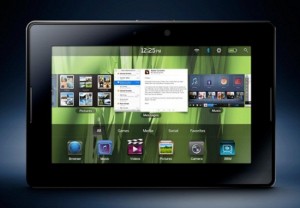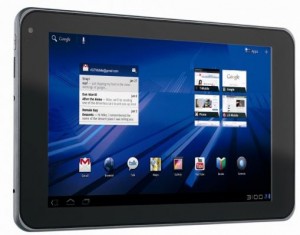Research In Motion has had an interesting month. ETCentric’s story submission stream has featured a number of PlayBook-related stories in recent weeks… from the tablet’s weak initial launch — to the unfortunate recall of 1,000 units due to faulty operating systems — to the news that it had surprisingly sold 250,000 units during its first month of availability. In fact, despite mixed reviews and April’s slow launch, RIM’s PlayBook managed to outsell the Motorola Xoom in its first month.
 In April, initial reports indicated a disappointing launch, with many units reportedly remaining on shelves during the first days of availability. Many reports credited the ongoing success of Apple’s iPad and the current lack of apps made for the PlayBook. Reuters reported: “RIM, which has priced the PlayBook to match the iPad, has struggled to win consumer fans since Apple’s iPhone and a slew of devices running Google’s Android entered the smartphone fray.”
In April, initial reports indicated a disappointing launch, with many units reportedly remaining on shelves during the first days of availability. Many reports credited the ongoing success of Apple’s iPad and the current lack of apps made for the PlayBook. Reuters reported: “RIM, which has priced the PlayBook to match the iPad, has struggled to win consumer fans since Apple’s iPhone and a slew of devices running Google’s Android entered the smartphone fray.”
Less than one month later, reports circulated that RIM had recalled approximately 1,000 units that were shipped with what the Wall Street Journal described as, “faulty operating systems which may have prevented users from performing the initial setup of the device.” The recall fell on the heels of RIM issuing a first-quarter profit warning, after citing lower-than-expected BlackBerry sales.
Yet not all news was negative. By the third week of May, RBC Capital Markets reported that the PlayBook had sold 250,000 units in its first month (it took Motorola’s Xoom two months to reach the same numbers). If the pace of PlayBook sales remains consistent, RIM will sell over 2 million units this year (slightly less than most analysts’ sales estimates for the tablet).
Of course, these numbers don’t come close to iPad sales, so the question remains: Is there a current tablet that is ready to compete with Apple’s iPad (at least in the near term)?
Related Reuters article: “RIM launches PlayBook but fans don’t play along” (4/19/11)
Related Wall Street Journal article: “RIM Recalls 1,000 PlayBook Tablets” (5/16/11)
Related BGR Media post: “250,000 BlackBerry PlayBook tablets sold to date, RBC says” (5/18/11)
Related Wired review: “BlackBerry PlayBook Tablet Lacks All the Right Moves” (4/13/11)
Related CNET review: “BlackBerry PlayBook review: A great surprise” (4/13/11)
Related SmartBlog post: “Will PlayBook play nice in the cloud?” (5/23/11)




